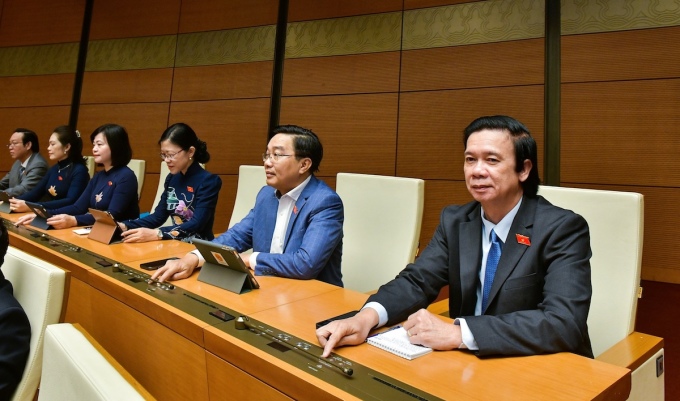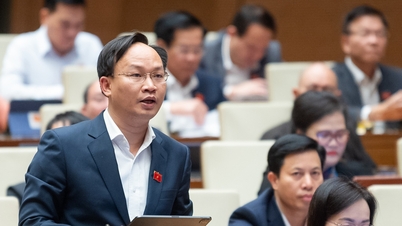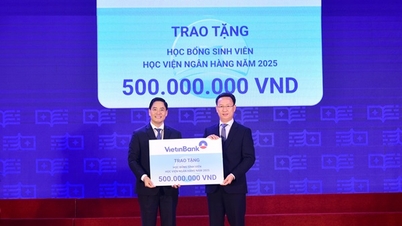The Prime Minister will decide on zero-interest loans for one year, without collateral, with banks under special control, according to the Law on Credit Institutions (amended) that has just been passed.
On the morning of January 18, over 91% of National Assembly deputies approved the Law on Credit Institutions (amended). Accordingly, from July 1, 2024 - the time this law takes effect, the Prime Minister will have the right to decide on special loans to banks without collateral with an interest rate of 0% per year, based on the proposal of the State Bank.
For special loans with interest rates and collateral, the State Bank is the competent authority to decide. The interest rates and collateral of this loan are regulated by the Governor of the State Bank.
The cooperative bank will decide on a special loan with the people's credit fund.

National Assembly deputies pressed the button to pass the Law on Credit Institutions (amended) on the morning of January 18. Photo: Hoang Phong
Also according to the approved Law, the share ownership ratio for individual shareholders is proposed to be kept as current, that is 5%. The limit for institutional shareholders (including shares that such shareholders indirectly own) is reduced from 15% to 10%; for shareholders and related persons is reduced from 20% to 15%.
Reporting on the acceptance before the National Assembly voted, Mr. Vu Hong Thanh, Chairman of the Economic Committee, said that there were opinions from delegates stating that reducing the share ownership ratio and credit limits had not resolved the problem of cross-ownership, manipulation, and domination of banks.
The National Assembly Standing Committee agreed with this assessment and said that in addition to reducing ownership ratios and credit limits, the Law on Credit Institutions (amended) adds provisions on providing and publicly disclosing information. Accordingly, shareholders owning 1% or more of charter capital must provide information, and credit institutions must publicly disclose this information for transparency.
The National Assembly Standing Committee proposed that the Government direct the State Bank and ministries and branches to have solutions to increase the effectiveness of inspection, supervision and monitoring to limit cross-ownership.
Regarding early intervention in credit institutions, the Law stipulates the disclosure of financial reports, except for banks under special control. In addition, regarding the unset risk provisions and the unallocated interest receivables, the National Assembly Standing Committee recommends that the Government, during the implementation process, assign the State Bank responsibility and find solutions to grasp the financial status of banks. This is to ensure support mechanisms to ensure the safety of the credit system.
Responding to the press at the press conference afterwards, Ms. Pham Thi Hong Yen, Standing Member of the Economic Committee, said that the new additional measures will help increase the self-reliance and self-responsibility of credit institutions.
"The law has provided solutions and a shut-off valve to ensure that the limitations and problems that have existed in the past are resolved," said Ms. Yen.
For example, regulations on management organization, risk management to help banks have better access to corporate governance. The law also supplements regulations on risk management, inspection, internal control of credit institutions... to increase competitiveness, resilience and avoid risks of each bank affecting the safety of the credit system.
The Law on Credit Institutions (amended) has been passed with significance in ensuring safety and innovating banking activities with a focus on restructuring the economy. Amended regulations such as reducing cross-ownership ratio, early intervention to avoid mass withdrawals from banks, special control of weak banks... are expected to help the process of restructuring credit institutions take place faster than before.
Source link



![[Photo] Prime Minister Pham Minh Chinh chairs the 16th meeting of the National Steering Committee on combating illegal fishing.](https://vphoto.vietnam.vn/thumb/1200x675/vietnam/resource/IMAGE/2025/10/07/1759848378556_dsc-9253-jpg.webp)




























![[Photo] Super harvest moon shines brightly on Mid-Autumn Festival night around the world](https://vphoto.vietnam.vn/thumb/1200x675/vietnam/resource/IMAGE/2025/10/07/1759816565798_1759814567021-jpg.webp)

































































Comment (0)